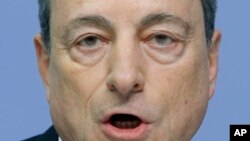Europe's top economic authorities warned Thursday of the dangers to the region from the slowdown in China, weak inflation and heightened geopolitical uncertainties.
Mario Draghi, the head of the European Central Bank, said it was imperative that policymakers act swiftly to deal with low inflation, while the European Union downgraded its growth forecast for the 19-country eurozone this year and warned of further reductions.
All eyes are on the ECB ahead of its next policy meeting on March 10. There's a growing consensus in the markets that the bank will follow up last December's stimulus boost with a further package of measures to help nudge up eurozone inflation, which is way below target at an annual 0.4 per cent rate. The bank's aim is to have inflation just below 2 per cent.
Draghi gave further support to those expectations on Thursday.
"The risks of acting too late outweigh the risks of acting too early," he said in a speech in Frankfurt, Germany.
Though low inflation helps consumers by making groceries and gas cheaper, it can signal underlying weak demand. And if it becomes chronic it can corrode the wider economy — it can make debt harder to repay and decrease spending by people and companies still working off debt burdens. And if low inflation or falling prices become ingrained, that can weigh on wages, investment and growth.
Since emerging from its longest-ever recession in the middle of 2013, growth has been too low to push inflation back up. External factors such as the slide in oil and raw material costs have only contributed to keep inflation low.
However, the eurozone is expected to keep struggling, according to the EU's executive branch.
The European Commission cut its growth forecast for the eurozone this year to 1.7 per cent from 1.8 per cent formerly. In 2015, the economy grew by 1.6 per cent, the Commission estimated — official figures are due next week.
"The weaker global environment poses a risk and means we must be doubly vigilant," said Pierre Moscovici, the Commission's top economy official.
Given that budgets across much of the eurozone remain stretched and economic reforms take time to bear fruit, a lot of the pressure on improving the region's fortunes has fallen on the ECB, which is the chief monetary authority for the 19 countries that share the euro. The bank has responded over the past year by cutting interest rates further and injecting more money into the economy.
Draghi rejected arguments circulating among economists that central banks cannot do much about excessively low inflation because of the sharp falls in oil and raw material costs. He said that attitude risks letting low inflation become ingrained in decisions about wages and prices.
Draghi warned against simply waiting until oil prices rise again and help bring inflation back to more normal levels. The longer the central bank waits, he said, "the greater the risk that inflation does not return to target."
Analysts think the ECB could add to its stimulus program, which currently entails 60 billion euros ($65 billion) in monthly bond purchases through at least March 2017 — effectively pumping new money into the economy. It could also cut the rate on the deposits it takes from commercial banks from its current rate of minus 0.3 per cent. The negative rate is aimed at pushing banks to lend money rather than hoarding it.




